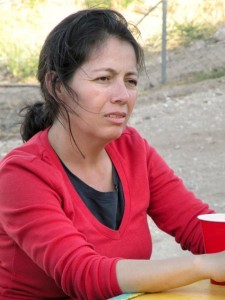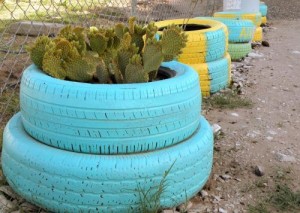
Date: 07/21/2014
Writer: Tiffany Acosta, 575-646-3929, [email protected]
Mental health is an important issue that often isn’t discussed openly especially in Hispanic communities, and New Mexico State University Social Work Associate Professor Maria Gurrola is working on ways to change stigmas on the issue.
In spring 2014, Gurrola partnered with a community organization, Del Cerro Nuevos Horizontes, in Vado, New Mexico, to build a community garden and to research mental health issues in the region, which the College of Health and Social Services funded.
“The main emphasis of the community garden is to have communication between the adults and the adolescents that live in the community,” Gurrola said.
The community garden was a way for adolescents and adults, including the elderly in the community, to work together to enhance the area, while Gurrola led conversations about mental health issues. The adolescents group consisted of 12-year olds to 18-year olds and the adults ranged in age from 30s to 94.
“My main emphasis within the project is mental health and how the communication between the adults and the adolescents has a lot to do in how we view mental health,” she said. “Most of it is the stigma of mental health and how often times we know someone is different and has problems, but we don’t try to work with them to see what we can do about it. Instead of trying to help, we hide it.”

The group started working the land of a donated lot in early January. The adolescents met on Wednesdays after school and on Saturday mornings. Typically, Gurrola would talk with the adolescents, then the adults and then together as one group.
“The literature tells us that there is a lot of need on the stigma of mental health, particularly in minorities and more in the Hispanic communities, because they don’t look for services,” she said.
Gurrola said she believes education is the best way to change the stigma about mental health issues.
“One of the things is, it has to be more open,” she said. “There is treatment. There is nothing wrong with it. A lot of the education that is being posted right now states that it’s like any other disease. It’s like having diabetes or having high blood pressure.”
At the community garden, the first three months included time spent clearing trash, rocks and dirt to prepare the ground for planting. In addition to the manual labor aspect, the group would take time to talk about issues such as depression, bipolar disorder, schizophrenia and substance abuse.
The community transformed the garden and reused items such as old tires for pots.
“We planted corn, beans, cucumber, tomatoes,” Gurrola said. “We’ve replanted some of the cactus that was there. We also put cilantro, pumpkins, watermelons and other flowers in between the area.”
After the planting was complete in April, the group continued to meet for maintenance to water and weed the area. These meetings gave Gurrola the opportunity to discuss how the adolescents see mental health.
“We already know from the literature about substance abuse in adolescents and how prevention can be very helpful. Most important is the services that are provided in rural environments,” she said. “We know in New Mexico that there are not a lot of services in the colonias.”
The adolescents told Gurrola that they were aware of services available in Las Cruces, but the need for services closer to home is very important.
Gurrola said discussions about how mental health and substance abuse can be related also occurred, and she believes that awareness and acceptance for mental health is critical to changing the stigma about the issue.
“They shouldn’t be ashamed if they have ADHD or if they have depression or if they have any other mental illness or it’s within their family.
“The community gardens were made as a place to meet and talk about mental health,” Gurrola said. “Mental health is a big issue in our community and often times we don’t have a lot of services and funds to be able to provide what the community needs.”
Gurrola said she plans to develop manuscripts on the project and publish her findings in journals.
For more information on the community garden project, contact America Terrazas at [email protected].
Watch this video on YouTube at http://youtu.be/V7BSik4KVag.
For more information on this, and other NMSU stories, visit the NMSU News Center.